Free digital skills training for Australian's aged 50 and older
The Ballarat East Neighbourhood House is proud to be a Network Partner of the Australian Government’s Be Connected Digital Literacy Program, which provides free local digital inclusion support.
In Term 1 and 2 of 2024, we had a series of free workshops at Barkly Square with our two Digital Mentors, Greg (pictured) and Eve.
Free Workshops with Greg or Eve
Our local Be Connected Digital Literacy teacher, Greg (pictured), delivered these engaging free sessions.
| Exploring MyHealth Records
9.30 am - 10.30 am, Tuesday 21 May Barkly Square, Ballarat East (Welcome Room, Ground Floor, Ballarat Regional Multicultural Council [BRMC] building, 25 Barkly Street, Ballarat East) Delivered by Greg |
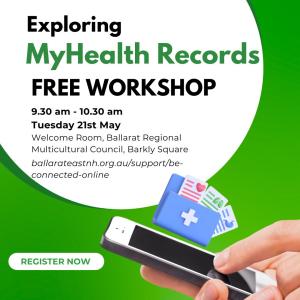 |
|
| Exploring MyGov
10.45 am - 11.45 am, Tuesday 21 May Barkly Square, Ballarat East (Welcome Room, Ground Floor, Ballarat Regional Multicultural Council [BRMC] building, 25 Barkly Street, Ballarat East) Delivered by Greg |
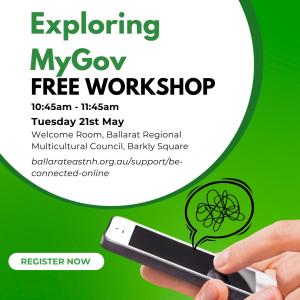 |
|
| Advanced Ways to Avoid Scams
10.00 am - 11.15 am, Tuesday 28 May Barkly Square, Ballarat East (Welcome Room, Ground Floor, Ballarat Regional Multicultural Council [BRMC] building, 25 Barkly Street, Ballarat East) Delivered by Greg |
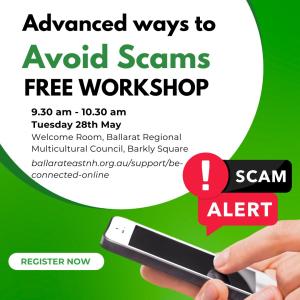 |
|
| Using the Internet for Hobbies
10.00 am - 11.15 am, Wednesday 29 May Barkly Square, Ballarat East (Welcome Room, Ground Floor, Ballarat Regional Multicultural Council [BRMC] building, 25 Barkly Street, Ballarat East) Delivered by Eve |
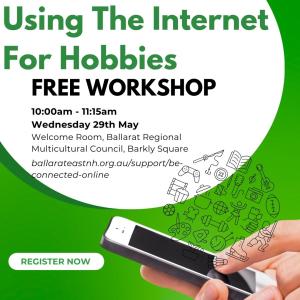 |
| Making the Most of Your Device
9.30 am - 10.30 am, Tuesday 4 June Barkly Square Delivered by Greg |
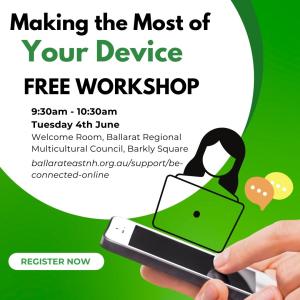 |
| Organising and Sharing Your Photos
10.45 am - 11.45 am, Tuesday 4 June Barkly Square Delivered by Greg |
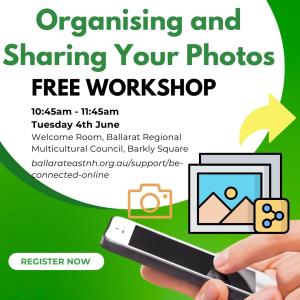 |
| Mirroring Your Device to the TV
9.30 am - 10.30 am, Tuesday 11 June Barkly Square Delivered by Greg POSTPONED - Contact us here to discuss Digital Sills Workshops |
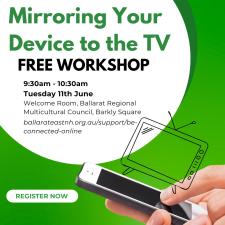 |
| Navigating the Be Connected Website
10.45 am - 11.45 am, Tuesday 11 June Barkly Square Delivered by Greg POSTPONED - Contact us here to discuss Digital Sills Workshops |
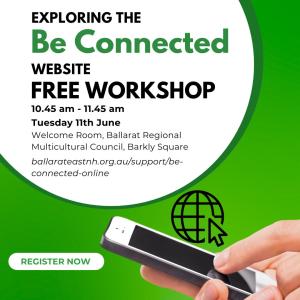 |
| Five Must-Do Steps to Protect your Device from Hackers
10.00 am - 11.15 am, Tuesday 18 June Barkly Square Delivered by Greg POSTPONED - Contact us here to discuss Digital Sills Workshops |
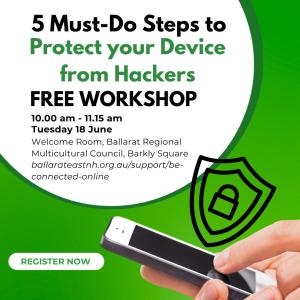 |
| Using your iPad
10.00 am - 11.15 am, Thursday 20 June Barkly Square Delivered by Greg POSTPONED - Contact us here to discuss Digital Sills Workshops |
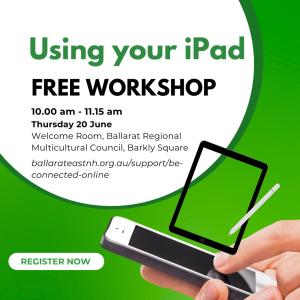 |
Be Connected Digital Literacy Program
The Ballarat East Neighbourhood House is a Network Partner of the Australian Government's Be Connected program.
We are excited to be partnering with the Ballarat North Neighbourhood House and Wendouree Neighbourhood Centre to deliver the 'Be Connected, Building Digital Skills' program. This is a grant to support Older Australians aged 50+ to develop their digital skills and confidence through free sessions, either one-on-one or in small groups, utilising the learning courses available on the Be Connected Learning site.
Our experienced Digital Mentors, Greg and Fiona, will be working closely with both Neighbourhood Houses to develop and deliver the program.
If you are aged 50 or older and would like to improve your digital skills, please contact us to register your interest.
Free online safety presentations
There are a host of free online safety presentations available on the Be Connected website.
Free digital skills courses
There is also a long list of free online videos on a wide range of digital skills topics on the Be Connected website.
Be Connected at Neighbourhood Houses
Digital Nation Australia 2021 Report
On 4 August 2021, the Good Things Foundation released the Digital Nation Australia 2021 Report.
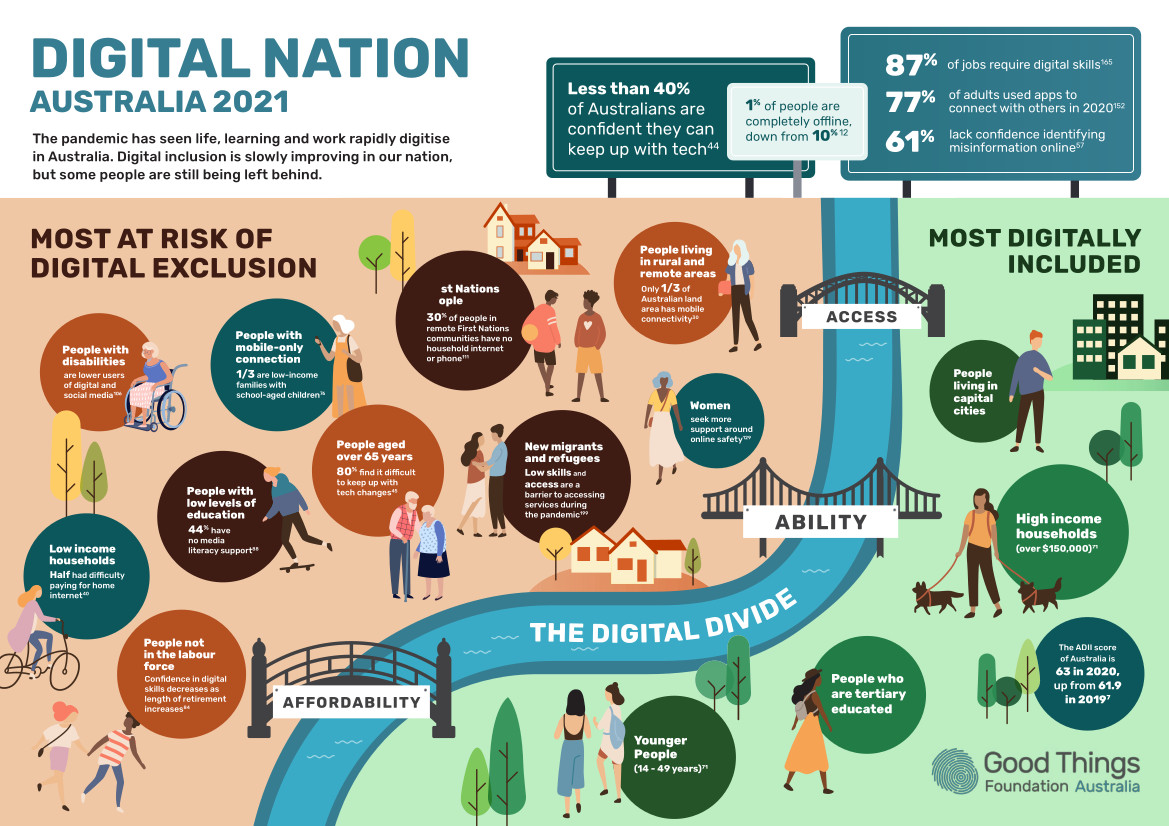
Source: https://www.goodthingsfoundation.org.au/news/digital-nation-australia-2021/
Key information included:
During the pandemic, the rate of people completely offline fell from 10% to just 1%. However, still fewer than 40% of Australians felt confident that they could keep up with the rapid pace of change in technology.
When pulling together this research, we found that the most at-risk groups for digital exclusion in Australia include:
- First Nations people: In remote First Nations communities, 30% of people have no household internet or phone connection.
- Rural and remote Australians: Even with the roll-out of the NBN, only one third of Australia’s land area has mobile connectivity. This is despite regional and remote areas making up 30% of the Australian population.
- Low-income households and those with a mobile-only data connection: Half of low-income households had difficulty paying for home internet. Meanwhile, one third of those with a mobile-data only connection are low-income families with school-aged children.
- Women: Low digital literacy means women are more vulnerable to online abuse.
- New CALD migrants and refugees: Low digital skills and access are a barrier to accessing services during the pandemic and job opportunities more broadly.
- People with disabilities: People with disabilities are lower users of digital and social media and are more likely to experience cyberbullying and digital abuse.
- Those over 65 years of age: 80% find it difficult to keep up with tech changes.
- People outside of the labour force: Confidence in digital skills decreases as length of retirement increases.
- People with low levels of education: 44% have no media literacy support.
This can have a big impact on people’s lives across employment, education, and safety. Research presented in Digital Nation Australia 2021 shows:
- 87% of jobs in Australia now require digital skills.
- 46% of employees were working from home in April 2020, and 58% of people said that the internet was essential to work during the pandemic.
- Since the pandemic, 81% of respondents in a survey by The Smith Family were concerned about students struggling to do schoolwork without reliable access to a laptop and internet.
- 61% don’t feel confident that they can identify misinformation online.
People who don’t have the essential digital skills to be safe and confident online and those who do not have affordable access to the internet are at risk of being left behind as the world moves further online.
eSafety Commissioner
Australia's eSafety Committioner, Julie Inman Grant, leads the world's first government agency committed to keeping its citizens safer online. eSafety is an independent statutory office supported by the Australian Communications and Media Authority (ACMA). eSafety has powers relating to cyberbullying, image-based abuse, and illegal and harmful online content.
Related research from the office of the eSafety Commissioner.






